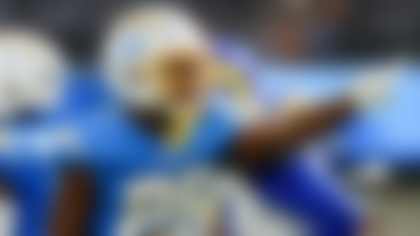NEW YORK -- Matt Higgins doesn't watch the 9/11 television specials. Never has, and probably never will.
The memories are all too clear for the Jets' executive vice president of business operations. At the time of the terrorist attacks, he was New York City Mayor Rudolph Giuliani's press secretary, and helping manage the crisis was part of his daily routine.
"There are a lot of images that, to this day, don't make a lot of sense," Higgins said in an interview with The Associated Press. "I don't think they ever will make any sense. They come back and then you put them back in their place until they come out again at this time of year."
It has been nearly 10 years since that September morning, when Higgins and so many others lost friends and family members. Having been there and lived through it all, Higgins has been working tirelessly to try to put together "an appropriate" night of commemorative events during the Jets' season opener Sunday night against the Dallas Cowboys. The night will include a halftime performance by Five For Fighting's John Ondrasik, whose song "Superman (It's Not Easy)" and its lyrics about heroes became an anthem for many during that time.
"We all felt a tremendous responsibility," Higgins said. "We felt the need to do justice to the occasion. I think that's our No. 1 priority. I think I feel that more than any other emotions right now, but it was, of course, just a terribly sad, sad day."
Higgins was driving through the Midtown Tunnel on the morning of Sept. 11, 2001, when the first plane hit the World Trade Center. After the second plane struck, Higgins pulled up to City Hall and tried to quickly organize a press conference for Giuliani just a few blocks from the site.
It wasn't long before Higgins and two other staff members realized they were in a dangerous spot. So, they dropped their equipment and headed back to City Hall.
"That's when the first tower collapsed," the 36-year-old Higgins recalled. "We all met up at a fire station -- the mayor, fire commissioner and police commissioner -- and I remember them being on the phone talking to the vice president talking about needing air cover in New York. No one had a full sense of what was going on at the time."
Within a few hours, Higgins was setting up what became Giuliani's first formal press conference at a nearby police academy. No one watching it knew where it was being held, and that was part of the plan.
"There was a clock tower in the background and a non-descript wall," Higgins said. "You're in the fog of war during that time period and you're not sure to what extent we were under attack."
Once things became clearer, Higgins was there as Giuliani kept in touch with the people of the city around the clock and tried to assure them that the government was still up and working.
"It was all him," Higgins said. "He was really operating on instinct."
A few days later, Higgins was working with the Secret Service and White House staff to plan President George W. Bush's visit to the site. At one point, he realized he was walking by the spot he had originally started to set up Giuliani's press conference and wondered if any equipment had made it.
"About a couple of hundred feet away, I saw this black box," Higgins said. "Sure enough, it was our mote box, covered with debris and crushed, but I turned it on, and it still worked. I couldn't believe it."
He brought it back with him to the police academy that night and huddled everyone together to check it out. Higgins kept the box with him for five years, and it's now part of the 9/11 Memorial and Museum.
"It's pretty amazing, really," he said.
A big part of Higgins' job in the weeks following the attacks was arranging for foreign leaders and representatives -- such as Russia's Vladimir Putin and Mexico's Felipe Calderon -- to visit the World Trade Center site.
"Almost every day, we were pulling in by boat and seeing the site again," Higgins said. "The magnitude of the tragedy is almost incomprehensible even when you try to recall it now. I went to the site with presidents from all over the world, but I spent a lot of that time in a haze."
Not to mention the fact Higgins was in his second-to-last semester at the Fordham University School of Law. He finished up, though, by somehow balancing tragedy and textbooks.
Giuliani's office was directly affected by the attacks. His top aide, Beth Hatton, lost her husband Terry, who was a captain for the FDNY's Rescue Company 1. Higgins soon went to work for the Lower Manhattan Development Corporation, the agency charged with rebuilding the site and met many family members of victims during his two years there. He even considers some of them friends now, such as Paula Grant Berry, a mother of three whose husband, David, died that day.
"That time was just so painful for so many people," Higgins said.
"He's a natural leader," said Johnson, a board member for the 911 Memorial Foundation. "He processes information well and is willing to take any information, any intel, and synthesize that in a coherent way. And, believe me, I know that was tough to do back then."
Higgins faced a personal crisis in April 2007, when he was diagnosed with testicular cancer. He faced it head on and beat it, and having to deal with so many difficult moments years earlier helped him get through it.
"I got to have more time," Higgins said. "All of us who survived the attacks have more time, so I'm grateful to have more time. So many people were denied these moments -- all of this time -- that I've had over these last 10 years. I think about those people who are dealing with those emotions on that day, and I'm hoping they feel we mark this anniversary appropriately."
Copyright 2011 by The Associated Press



